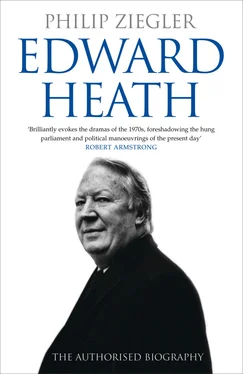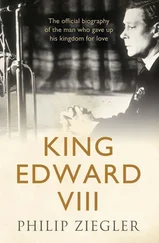Isis for describing his father as ‘a jobbing builder’. Heath scrawled angry denials against several of Campbell’s assertions but here he merely noted that it was the
Sunday Express and not
Isis which had used the phrase. 6William had all the fierce conservatism so often to be found in the small and struggling businessman. During the First World War he had been assigned to the Vickers armaments factory at Croydon and forced to join a union. ‘It was terrible,’ he remembered. ‘The union was all right, it was the way it was run. There was a clique of people in control and unless you were in the clique you couldn’t get anything past.’ 7In his own life as a builder he resolved to have as little to do with unions as could be contrived, and he inculcated in his son a conviction that, whilst unions as an institution were acceptable, even desirable, they should never be allowed to run riot or to consider themselves above the law.
William Heath was a man of intelligence, common sense and limited education. The few letters to his son which survive in the archive at Arundells, Heath’s house in Salisbury, are sound in content but wayward in grammar and spelling; in one short letter we have ‘emportant people’, ‘busness’, ‘we planed our week’, ‘untill’, ‘they have wrote to him’ and a dearth of question marks and apostrophes. Possibly he suffered from what would now be diagnosed as dyslexia; certainly he left school at the age of twelve and never had time to continue his formal education. He never doubted its value, however, and was resolved that his children should have a better start than he did. In this ambition his wife wholeheartedly supported him.
Without Edith Heath, indeed, it is unlikely that Ted would have been launched so successfully on his vertiginous career. She was a Pantony, another Kentish family, and her father had been gardener in a big house a few miles from Broadstairs. She became lady’s maid to a rich, exacting but benevolent mistress and absorbed uncritically the values of propriety, decorum and unostentatious good-living which she found in the home of her employer. In his description of Edith Heath, John Campbell used the phrase ‘strait-laced’; 8Heath underlined it, usually an indication of disagreement. It seems apt enough. Certainly she tolerated, if perhaps silently deplored, her husband’s conviviality, but she kept a house that was resolutely clean and well ordered and dedicated herself, to an extent for which William had neither the time nor the inclination, to instilling in her elder son the habit of hard work and a burning hunger to succeed. ‘She was the driving spirit,’ a childhood friend of Heath’s remarked. ‘His father was a nice guy but without the drive his mother had. She was the one who encouraged…the ambitions.’ Heath felt her to be beyond reproach. ‘My mother was a wonderful woman,’ he wrote in his memoirs. ‘My lasting memory is of her beauty and calmness…At home we adored her for these traits and also because she was so supportive of us.’ Some felt her resolution verged on the implacable and detected in her not so much tolerance as contempt for the looser standards of her husband. Certainly she was strong-minded and convinced that her values could not be questioned, but she was sensitive and generous, ready to endure the shortcomings of anyone except herself and her beloved son. She missed no opportunity to inculcate her most cherished values in her children. As a Christmas present when he was eight Ted was given a leather commonplace book in which various improving thoughts had already been inscribed. The first was: ‘To get you must give, but never give to get.’ Some time later she added: ‘Make new friends but keep the old. One is silver, the other is gold.’ Ted made little effort to improve on these but the book was still in his possession when he died. 9
Different though they were, both physically and psychologically, William and Edith Heath were happy in their marriage. Edith may have been the stronger character and certainly it was her standards that prevailed at home, but she was wise enough to ensure that her husband never felt himself excluded or ignored. ‘In a marriage, nobody’s boss – I don’t believe in that,’ he told one of Heath’s biographers, and everything suggests he approved heartily of the way his wife was bringing up his children. They started life in St Peter’s-in-Thanet, a village now absorbed into the Kentish holiday resort of Broadstairs. Teddy – the use of ‘Ted’ seems to have become habitual during the Second World War, he was never known as ‘Edward’ – was born on Sunday, 9 July 1916. His middle names were Richard and George. Almost immediately the family abandoned St Peter’s to move inland to Crayford, where William Heath had been assigned to war work at the Vickers aircraft factory. Only a few months old, Teddy was spared the worst rigours of what must have been a miserable winter. Wartime privations were at their worst. ‘We had a ramshackle house,’ William Heath remembered, ‘and the wind used to whistle round it like a pack of wolves. I remember begging in the street for coal and potatoes…It was a terrible time.’ ‘Begging’, presumably, involved asking for an additional ration from under-supplied shopkeepers rather than soliciting from passers-by. William Heath was never unemployed and quite well paid – but the last two years of the war were exceptionally difficult. It may have been these problems which deterred the Heaths from adding to their family; at all events it was four years before Teddy acquired a brother, John. 10
The difference between the two boys was quickly apparent. By the time he was eight or nine Teddy was conspicuously diligent and hardworking, with formidable powers of concentration and a distaste for anything bordering on frivolity. John, on the other hand, was amiable, messy, easygoing and almost entirely without ambition. He viewed his elder brother with a mixture of awe, incredulity and derision. Many years later the journalist John Junor had a conversation with John at a party and found him ‘a very dull chap indeed. Pleasant but commonplace.’ This was the general verdict. Ted Heath always denied hotly that he had been his mother’s favourite or had been given any special treatment. The evidence of those who knew the family well – Nancy-Joan Seligman, Araminta Aldington – is that, on the contrary, Edith Heath, without ever being consciously unkind to her younger son, lavished most of her loving attention on Teddy. She always put his needs first, said John’s widow, Muriel; it was taken for granted in the household that the normal rules of conduct were suspended for his benefit. ‘She spoiled Teddy rotten,’ recalled Margaret Chadd; whenever he came to stay with the Chadds he left his pyjamas all over the floor and assumed that somebody else would pick them up. The inevitable result was that John, finding that nothing was expected of him, responded by achieving nothing. At school one day he overheard two masters extolling Teddy’s virtues: ‘Of course his brother is nothing like…’ one of them added. John accepted without undue dismay the fact that he was ‘nothing like…’; Teddy took it for granted that he too was ‘nothing like…’; nothing like John nor like the generality of his schoolfellows. He grew in confidence while John resigned himself to rubbing along in contented obscurity. 11
Teddy began his schooling at a dingy little church school in Crayford. He learned enough to be well able to cope with the next stage of his education but his life did not really take off until the family returned to Broadstairs in 1923. Broadstairs then as now was an amiable little seaside resort, busy in summer, under-occupied in winter, with few buildings of distinction but many of quiet attractiveness. It prided itself on its connections with Charles Dickens: a suitably bleak Bleak House still looms over the seafront; plaques abound asserting that the author wrote this or that book while in residence; Heath’s favourite was a discreet notice proclaiming ‘Charles Dickens did not live here’. Though neighbouring Margate and Ramsgate were better equipped to handle yachts of any size, Broadstairs was rich in boats. In spite of their maritime antecedents, however, the Heaths were neither rich nor enthusiastic enough to own a boat themselves.
Читать дальше












